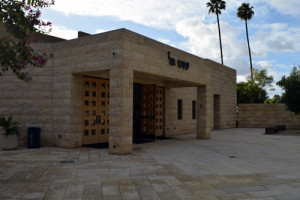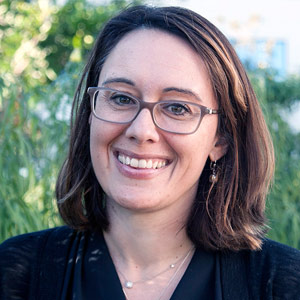By Donald H. Harrison


SAN DIEGO — Jewish Family Service will shut down its College Avenue Senior Center on Friday, Sept. 27. A Resource Fair for the older adults who still use the once-thriving center will be conducted on site on Thursday, Sept. 26, at Temple Emanu-El, 6299 Capri Drive, in the Del Cerro neighborhood of San Diego.
Whereas in its heyday, the College Avenue Senior Center drew between 80 and 120 people for a full day of programming, including lectures, exercise, movies, and an inexpensive kosher lunch, since its resumption after the COVID pandemic, the center’s attendance has averaged only 15 people, and even fewer for the lunch program, according to JFS Chief Operating Officer Dana Toppel.
Toppel expressed doubt that attendance at the center could have been built back up to previous levels, adding that as a member of the California Commission on Aging, she is aware of more modern initiatives to serve seniors in other parts of the state. Seniors who tire of coming back to the same church or synagogue every day for lunch like to try new places, she said. Some locations in California are “actually doing stipends for people to go out to restaurants together.”

She told San Diego Jewish World that the several JFS employees at the College Avenue Senior Center have accepted other jobs relating to older adults within the Jewish Family Service organization. Toppel said that while JFS no longer will be a rent-paying tenant of Temple Emanu-El, discussions are being held with that Reform congregation to find other ways to collaborate and ease its financial loss.
Seniors who live in such San Diego neighborhoods as College, Del Cerro, San Carlos, Allied Gardens, and Grantville as well as in the nearby cities of El Cajon, La Mesa, and Santee may wish to attend the Sept. 26 Resource Fair “where they will know about our other programs from Foodmobile, to On the Go, to our Friendly Match program (which pairs seniors with volunteers), Toppel said. Arrangements are being made to serve lunches to the seniors at another secular location, which Toppel said will be identified after those arrangements are concluded.
“I think as far as social opportunities go, our On-the-Go program provides transportation to anywhere people want to go,” Toppel said. “We’ve seen growing participation when we do excursions to museums or other places.” Toppel, who will succeed Michael Hopkins as JFS’s chief executive officer on July 1, 2025, said she has been discussing partnerships with Betzy Lynch, the CEO of the Lawrence Family JCC, to better serve the senior community.
Toppel also invited seniors to become volunteers for JFS, which has numerous social service programs, not just for us Jews but for the community at large. Just a few examples are a way-station for migrants who have been admitted to the United States legally while they await decisions on their bids for asylum in the U.S.; food distribution programs for those in certifiable need; safe parking and rest room facilities for homeless people who live in their vehicles; transportation service for seniors and disabled persons; the Balboa Avenue Older Adult Center for people with Alzheimer’s Disease and dementia, and personal and group counseling programs.
The closure of the College Avenue Senior Center is another reflection of the Jewish community’s changing living patterns in San Diego County. Whereas in the 1970s, the aforementioned neighborhoods housed a major portion of the Jewish community, many Jewish families gradually moved to La Jolla and to North County Coastal and Inland neighborhoods and to nearby suburban cities such as Del Mar, Solana Beach, Encinitas, and Poway. Jewish institutions soon followed. The JCC which had been located on 54th Street in San Diego moved to its current home in La Jolla. The San Diego Hebrew Home, which sat on a hill behind the 54th Street JCC, moved to Encinitas, restyling itself as Seacrest Village Retirement Communities. The San Diego Jewish Academy campus that had been located at Tifereth Israel Synagogue in San Carlos moved to its present location in Carmel Valley, where the Tifereth Israel Synagogue campus was merged with a sister campus that had operated on the grounds of Congregation Beth El in La Jolla.
As these Jewish institutions departed eastern San Diego, some remaining Jewish residents expressed the feeling that they were being abandoned by the Jewish community. Toppel, a resident herself of Del Cerro, expressed concern about these feelings and said Jewish Family Service at a date to be determined after the High Holy Days will set up listening sessions to hear ideas and concerns from residents of eastern San Diego and the adjoining cities.
She said JFS has been exploring the idea of conceptual Jewish villages throughout San Diego County. At the same time, the Lawrence Family JCC has been developing a similar concept called “Jeighborhoods” to bring JCC programming to communities outside La Jolla. Toppel said she would like to explore partnering with the JCC and with the Jewish Federation of San Diego to flesh out those ideas.
*
Donald H. Harrison is publisher and editor of San Diego Jewish World.
Last week when I heard our senior center was closing I was filled with dismay. The reason most of us have not returned since the pandemic is because the senior center never brought back the programs they had before the pandemic began. They never brought back the newsletter that told us the programs each month, and they never brought back the lunch menus for the month that were part of the newsletter. They never brought back the very popular exercise class I attended. The members filled the entire room and many members of the class stayed for the lunch. If they brought back the lecture series, I never knew because I never got any publicity. Our exercise class is still being held on zoom, but some members of the old class that met at the center are not in attendance because they are not computer literate. Yes, I too feel that JFS is abandoning those in the eastern part of San Diego, and we would never travel to the JCC on a weekly basis because of the distance.